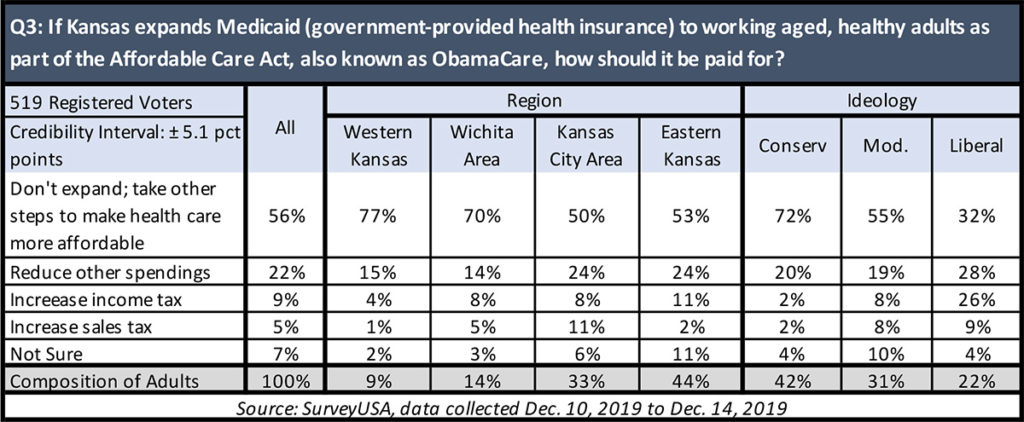Governor Laura Kelly and Kansas Senate Majority Leader Jim Denning held a press conference in the Capitol rotunda to announce what they described as a compromise Medicaid expansion plan. However, when the Sentinel asked about what compromises were made, Governor Kelly merely noted that work requirements were a sticking point.
“I know that they were something a lot of folks on the Republican side made an issue of. We were able to work that out by putting in the very robust workforce referral,” said Kelly.
So instead of requiring people to work as a condition of getting free medical coverage from taxpayers, Kelly’s ‘compromise’ will merely result in some new Medicaid recipients being told they may have skills that match with existing job openings. Kelly spoke at length about the need to build up the workforce but didn’t explain her opposition to requiring Medicaid recipients to fill open positions as a condition of getting free healthcare from Kansas taxpayers. “The biggest issue we have in our communities and businesses is just the shortage of workforce. So as an administration we have been scouring every potential workforce population.”
But refusing work requirements for an estimated 90,000 adults who would qualify for expansion under the plan disproves her claim of ‘scouring every potential workforce.’ The work referral program will be based on two questions added to the Medicaid application; one pertaining to applicants’ current employment situation and the other asking why their current situation prevents them from getting a job. The answers to those questions will be used to determine who should be referred to the Kansas Works program. Coverage for working-age, able-bodied adults in Medicaid expansion will not be contingent on getting work, just answering the questions on the application.
Voters want work requirements
The Kelly-Denning plan defies voters according to a public opinion poll conducted by SurveyUSA for Kansas Policy Institute, the parent company of the Sentinel. Asked whether they support or oppose work requirements, 71% of Kansans support is and only 15% are opposed. Even Gov. Kelly’s moderate and liberal base support work requirements; 69% of self-identified moderates favor work requirements and only 13% oppose, while self-identified liberals support it by a 53%-32% margin.

Voters oppose Medicaid expansion
Voters want work requirements if Medicaid is expanded but they remain opposed to expansion overall. Instead of simply asking whether participants whether they support expanding a government program, voters were asked, “If Kansas expands Medicaid (government-provided health insurance) to working-aged, healthy adults as part of the Affordable Care Act, also known as ObamaCare, how should it be paid for?”
The majority – 56% – said don’t expand but take other steps to make health care more affordable. The next highest response – 22% – said to reduce other spending and 14% said to pay for Medicaid expansion by raising the income or sales tax. So once again, the Kelly-Denning plan defies voter wishes.

Denning says expansion will be partially paid for by a hospital fee of approximately $35 million. “There is no hospital tax, there is a hospital surcharge. They are going to chip in $35 million to help pay for the program.” Denning continued, “99% of the hospitals will be just fine chipping in.”
The Sentinel asked the Kansas Hospital Association if the $35 million in fees will be passed on to patients but they did not respond. In reality, the $35 million will more than likely be passed on to patients through higher prices resulting in higher insurance premiums.
According to Nic Horton, Research Director with the Foundation for Government Accountability, the costs for Medicaid will end up being paid by the average Kansan. “It’s all ultimately going to be passed on to patients or taxpayers. That’s where hospitals get their revenue. So it’s just a big shell game,” said Horton. Hospitals are getting a good deal. For $35 million in fees, hospitals have access to nearly $1 billion dollars a year in state and federal funding. That is a good deal for hospitals but it comes at taxpayers’ expense.
“Where we structured it with the hospitals chipping in and giving us a hand to get Medicaid expansion and insurance for the same $35 million,” said Denning.
Denning said the state’s cost would also be $35 million, which, along with the hospital fees, would put the total cost at $70 million, but the Kansas Health Institute estimated last year that the gross cost to the state at more than $100 million each year. This is over and above the 90% match from the federal government, which Kansas Health Institute estimates that will be $6.9 billion over ten years. Since the federal government is already running a huge deficit, that $6.9 billion will increase the national debt and eventually have to be paid back – probably with higher taxes on individuals and businesses.
Spiraling healthcare costs, Medicaid overruns
Critics of the Medicaid expansion plan point to spiraling healthcare costs as a missing piece of the Kelly-Denning plan. As Senate President Susan Wagle noted the plan does not address a laundry list of health issues in the state. “Expanding a broken system that doesn’t allow physician choice, limits pharmaceuticals and therapies, places Kansans in waiting lines and delays payments to providers; doesn’t address the one problem most Americans face. That is, the escalating cost of health insurance.”
Horton agrees, noting, “Enrollment has spiraled out of control; costs have been significantly higher than promised, and truly needy Americans have been left behind. That’s exactly what Kansas can expect to see if they continue to go down this path. No amount of window dressing or rebranding can change those facts.”
At the press conference, Governor Kelly said, “I pledged to Kansans that as Governor I would not move Kansas to the right, I would not move Kansas to the left, I would work to move Kansas forward.”
The SurveyUSA poll shows Kelly has a much different definition of ‘moving forward’ than Kansas voters.


